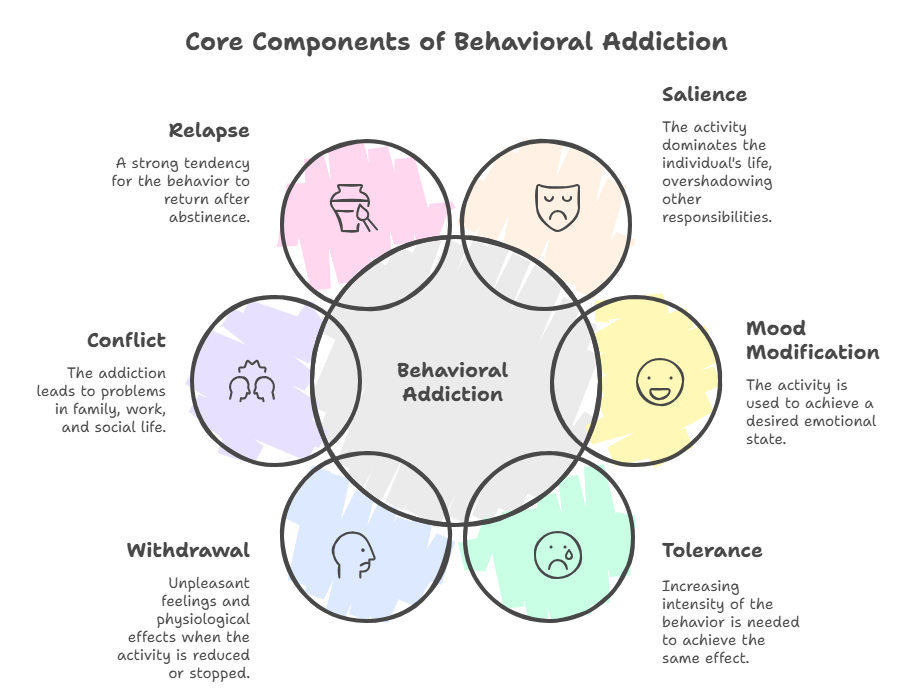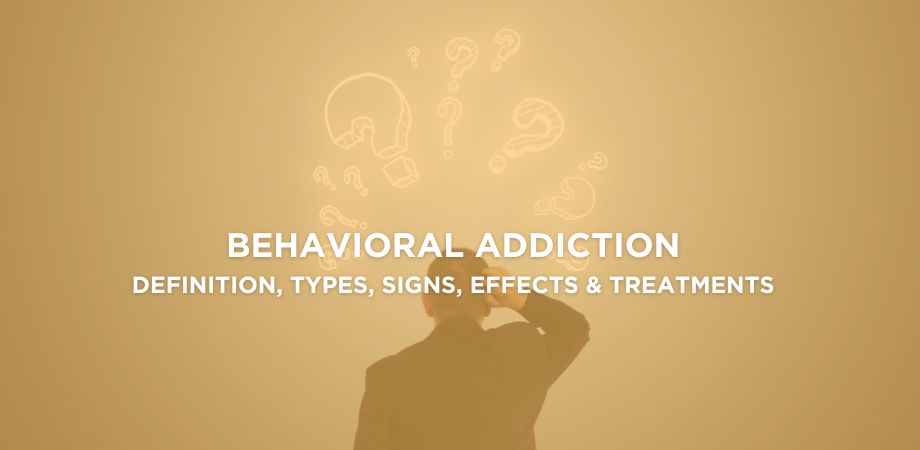Behavioral addiction is a compulsive behavior that follows the core addictive patterns of substance addiction. The compulsive conduct makes individuals engage in actions, even though it significantly impairs their lives. In India, behavioral addictions vary from 2% to 33%, with problematic internet use and gambling being the major contributors. This highlights a growing public health concern in society.
Behavioral addictions are predominantly classified as gambling and internet addiction; however, there are several other behavioral addictions. This includes internet use, sex/pornography, shopping, exercise addictions, etc. These addictions showcase compulsive behaviors, which have a similar prognosis and parallels to substance abuse addictions. The effects of these addictions include financial troubles, social isolation, strained relationships, and the onset of co-occurring disorders.
Effective treatment of these addictions requires a multi-model approach, with Cognitive Behavioral Therapy (CBT) and other therapies being at the forefront. Medications and family therapy sessions can also help lower the urge to addiction. Additionally, group therapy or Gamblers Anonymous groups can help prevent relapse. At Alpha Healing Center, we offer personalised plans to our clients to heal the mind, body, and soul. Get in touch with our team to know more.
What is the Definition of Behavioral Addiction?
Behavioral addiction is a type of psychological dependency characterized by a compulsion to engage in non-substance-related activities or behaviors. The addiction influences the dopamine levels of the brain, similar to substance addiction. At the start, the behavior is used to change your mood or induce pleasure, but eventually it leads to loss of impulse control.
Behavioral addiction affects the neurochemical system, which influences the brain’s limbic system. This in-turn influences the natural reward system alongside the dopamine surge, making the brain prioritize the addiction. The constant exposure triggers neuroplasticity, allowing the brain to adapt to the addiction. This reduces the number of dopamine receptors in the neural pathways, making the addiction feel normal.
Currently, gambling is the only disorder listed in DSM-5 as a non-substance addiction, with internet gaming as a condition requiring further study. However, several other behavioral addictions showcase compulsive behaviors, which are missing from the journal as of now.

What Are the Core Components of Behavioral Addiction?
Behavioral addiction isn’t just a bad habit; it is a full-fledged addiction syndrome. It has 6 major components that make up the addiction. These behavioral markers or diagnostic criteria include
- Salience: It is a particular activity that becomes important in an individual’s life, dominating all aspects of their life. Here, they may be occupied in planning the activity or thinking about previous activity, even though they are supposed to do other tasks.
- Mood Modification: The addictive activity soon turns out to be an important task to achieve a desired emotional state.
- Tolerance: As time passes, a high intensity of the behavior is needed to achieve the same mood that was originally experienced. For a gambler, it may be placing more bets, and for a gaming addict, it may be spending more time gaming.
- Withdrawal: An unpleasant feeling that may incur physiological effects when the activity is reduced or stopped. It generally manifests in extreme anxiety, headaches, irritability, or moodiness.
- Conflict: The experience leads to problematic consequences, which affect family, work, and social responsibilities. Individuals may want to stop, but are unable to, even though it is harmful for them.
- Relapse: After a long period of abstinence from the activity, there is a strong tendency for the behavior to return. In fact, about 50% of addicts go into rehab after getting treatment within the first 12 weeks.
How Does Behavioral Addiction Differ from Substance Addiction?
Behavior addiction and substance addiction have similar neurobiological effects, where the brain reward system has similar core components. However, there are some key differences between them.
The major difference is that the ingestion of harmful toxicants is absent in behavioral addiction. These harmful toxicants subsequently result in physical withdrawal symptoms, which include tremor, vomiting, seizures, etc. Behaviour addiction is a psychological addiction, which only causes distress or anxiety during withdrawal.
What Are the Common Types of Behavioral Addictions?
There are a number of behavioral addictions, which force compulsive behaviors, which make them addictions. Some of them include
Gambling Addiction
Gambling addiction is the persistent behavior of gambling, which results in distress and impairment. The prevalence of lifetime gambling in India is 19.5% and problematic gambling is 7.4% in college students. The rise of online betting has led to a further influx of gambling addiction in the country.
Internet Addiction
Internet addiction can be defined as the recurrent use of the internet, may it be for online games, scrolling through social media, etc. In India, internet addiction is prevalent among students, ranging from 4.0% to 19.1%. The rate amongst adults ranges from 0.7% to 18.3%.
Pornography Addiction
Pornography is a major problem amongst the youth around the world. The compulsive engagement with pornography results in neglect of life activities and conflicts in relationships, or feelings of guilt. As per a study, around 8.3% of individuals were using pornography, but only 0.2% were addicted to pornography.
Sex Addiction
Sex addiction or compulsive sexual behavior disorder is characterized by persistent patterns of sexual thoughts. The behavior is fueled by anxiety or depression rather than a relationship connection. This can result in loss of control, financial problems, loss of a relationship, or risk of acquiring STDs. A nationally representative sample indicated that 8.6% of the individuals show signs of sex addiction.
Masturbation Addiction
Masturbation addiction can be encompassed under the Compulsive Sexual Behavior Disorder (CSBD). It is a pattern of failure to control intense, repetitive sexual impulses or urges resulting in repetitive masturbation. Masturbation addiction is a serious issue in India, and it drains an individual’s energy, esteem, and instills a sense of guilt.
Shopping Addiction
Shopping addiction is characterized by a repeated, compulsive need to buy or shop for new items. Shopping addiction may leave a negative or stressful response, which may lead to financial woes or debts. In India, around 7.2% of individuals suffer from shopping addiction, compared to other behavioral addictions.
Smartphone Addiction
Smartphone addiction is an emerging and serious behavioral addiction plaguing the world. The advancement of phones has brought new apps and features that have pulled the young and old to be avid users of them. According to a study, between 39 to 44% of urban adolescents are addicted to smartphones in India. This is a serious risk and needs to be looked at before it gets out of hand.
Sugar Addiction
It cannot be fully considered as an addiction, but you can encompass it in food addiction. The addiction involves the compulsion to eat highly palatable food rich in sugar, which can alter the brain’s neural thinking. As time passes by, it may become a compulsion to need more sugary foods in the diet.
Video Game Addiction
Video game or gaming addiction involves individuals persistently engaging in video games (digital or internet-based) for extended periods. It is classified as the 11th Revision of the International Classification of Diseases (ICD-11) by the World Health Organization. In India, 5.3% of individuals suffer from video gaming addiction, and with the rise of esports, it may soon go up.
What Are the Signs and Symptoms of Behavioral Addictions?
Behavioral addiction involves an array of signs that show dependence, loss of control, and continued use despite its consequences. These signs can be classified into emotional, physical, and behavioral domains.
Emotional Signs
The emotional signs involve constant thoughts and cravings for the behavior to be engaged again. Extreme mood swings, irritability, and inability to perform other tasks are other major signs. Apart from this, an intense feeling of guilt or shame can occur after performing the act.
Physical Signs
The physical signs of behavioral addictions include sleep disturbances, poor hygiene, weight loss, or overall health deterioration.
Behavioral Signs
The behavioral signs may involve hiding the extent of the addiction or avoiding key responsibilities. Individuals may often end up in debt or financial difficulties due to their addiction.
How to Recognize Behavioral Addiction in Its Early Stages?
Recognising behavioral addictions at an early stage can help tackle the addiction better. At an early stage, the addiction may be confused with a hobby, so it is critical to identify it before it gets worse. Some signs include
- Spending more time on the activity than planned
- Daydreaming and thinking of the activity
- Displaying irritability or a quick temper
- Avoiding daily tasks or duties for the activity
- A flicker of guilt after the end of the activity
How Do Behavioral Addiction Symptoms Progress Over Time?
Behavioral addictions progress in 4 major stages that affect the life of an individual. They include
- Initial dependence: It starts with the individual discovering the behavior and using it as a means of relief or pleasure.
- Escalation: Individuals start to spend more time in the activity, and the behavior becomes less about pleasure and more about dependence.
- Life Disruption: The behavior impacts a major part of the individual’s life, causing major consequences. This may include strained relationships, job loss, or academic failure.
- Despair Phase: The individual is trapped in the behavior and experiences physiological effects if they try to withdraw. This can eventually lead to mental illness and the development of co-occuring disorders.
What Are the Causes of Behavioral Addictions?
Behavioral addictions can be caused by an array of factors that affect the person’s life. This may include
- Genetic predispositions: The genetic makeup of an individual can impact the onset of addiction. In fact, 40%-60% of a person’s vulnerability to addiction occurs if a sibling or parent is suffering from addiction.
- Psychological trauma: Mental health conditions can usually make individuals dependent on addiction to find respite.
- Environmental stressors: Poor environmental conditions, like poverty, stress, or family conditions, can make individuals turn to addiction to find respite.
Which Demographics Are Most Vulnerable to Behavioral Addiction?
Youth and high-stress working professionals, alongside veterans, are prone to behavior addiction. The youth are especially vulnerable due to the appeal of digital platforms and the lack of regulation. Veterans globally have a high risk of addiction due to conditions like trauma or PTSD. A study suggested that the gambling rate amongst veterans is 2% and 4.2% for high-risk gambling.
What are the Effects of Behavioral Addiction?
Behavioral addiction affects the entire life of the addict, leading to several negative consequences. Some of its effects include:
- Financial problems: Behavioral addiction, like shopping or gambling, can lead to the accumulation of debt and bankruptcy. Some individuals may even sell off their personal assets to fund their behavior.
- Strained relationships: Mistrust or conflicts due to the addiction can lead to the breaking of relationships or marriages.
- Increased stress and anxiety: The behavior that brought respite and relief at the start can soon cause stress and anxiety as consequences mount.
- Neglect of responsibilities: Failure to meet work deadlines, miss school, or forget to perform basic household responsibilities.
- Loss of productivity: Addiction severely degrades focus and reduces productivity in completing tasks at work or school.
- Emotional instability: Erratic mood swings with sudden highs and despairs following the addiction.
- Social isolation: Addicts find it difficult to hang out with non-addicted individuals, as they feel out of place among them.
- Legal issues: Gambling or money-related issues can land individuals in legal trouble and can even lead to jail time.
- Physical health decline: Disturbance in physical health due to a lack of exercise or a proper diet.
- Depression: Guilt of engaging in an activity can bring shame after looking at its consequences. This can lead to clinical depression or suicidal tendencies.
- Impulsive decision-making: Decline in cognitive functioning can lead to an individual making poor choices.
- Sleep disturbances: Thinking about the activity can result in sleepless nights and restlessness.
- Decreased self-esteem: A feeling of powerlessness, resulting in the inability to control a behavior despite the damage it causes.
- Obsessive thoughts and behaviors: Constant thoughts about the activity.
- Difficulty controlling urges: Compulsive urge to resist is the hallmark of behavior addiction.
What is the Treatment for Behavioral Addiction?
Treatment for behavioral addiction aims to tackle the issue of compulsive seeking and manage any mental health issues. The treatment incorporates a holistic treatment plan, which is a mix of Cognitive Behavioral therapy, family therapy, group therapy, and medication. These treatments encompass the psychological side of things, which is quite helpful for veterans or people suffering from stress. The treatment includes:
Individual Counseling
CBT is a key component of individual counselling for addiction recovery. The treatment plan aims to change negative thinking patterns and instill positive ones. This is great for gambling and internet addiction. It also helps veterans address PTSD and trauma. At Alpha Healing Center, we have some of the best staff in the industry, who help our patients achieve swift recovery.
Group Therapy
Group therapy is a peer support therapy where patients can vent out their guilt without being judged. The session is led by a professional therapist and involves a small group of patients. This allows participants to gain perspective and build more relationships.
Family Therapy
Family therapy is essential as addiction impacts the entire family. The therapy aims to help the family understand the addiction and support the patient instead of worsening the addiction. The therapist aims to rebuild trust, which was affected by the addiction.
Medication Management
Medication management is not a cure, but a tool to reduce compulsive seeking and target any mental problems. It can help patients with gambling disorders who have severe depression. Antidepressants like SSRIs can help reduce stress and help in the treatment.
Mindfulness and Meditation Practices
Mindfulness and meditation programs aim to manage cravings and prevent relapse. These practices help patients understand their cravings or stress without reacting to them. This allows them to build a distance between the urge and learn impulse control.
12-Step Programs
It is a non-professional, mutual fellowship group based on the spiritual framework guided by the 12-step program. These groups provide an accessible support network that helps prevent relapse and maintain daily maintenance of the addiction.
What Are the Challenges in Treating Behavioral Addictions?
The treatment of behavioral addictions comes with its challenges. To start off, patients usually are in denial due to stigma or social acceptance. A majority of individuals with addiction have co-occuring mental conditions, so it is essential to address both conditions. Additionally, accessibility and costs of treatment may be high for some individuals. Finally, treatment is a long-term process, with high chances of relapse, making maintenance a challenge.
Can you Recover From Behavioral Addiction?
Yes, behavioral addictions usually co-occur with substance addiction. One addiction can easily lead to others to sustain the first. For example, a person suffering from gambling or gaming addiction can turn to alcohol or drug addiction to numb the pain. This can eventually lead to co-occurrence, and both addictions have to be treated to attain complete recovery.
How to Prevent Behavioral Addiction?
The effective ways to prevent behavioral addiction require building resilience to fight the addiction and ensuring early detection to prevent adverse effects. Preventive measures also include training for stress reduction to alter behaviors and teach emotional regulation skills. Additionally, you need to set limits on your activities, like screentime, internet, or other risky activities, which can become an addiction.
What Resources Are Available for People Struggling with Behavioral Addiction?
Individuals struggling with addiction can seek help from different sources. Some of them provide immediate support, while others provide long-term support. The resources to help patients include
- Crisis hotlines support
- Support groups like Gamblers Anonymous, Overeaters Anonymous, Sex Addicts Anonymous, etc.
- Certified addiction counselors
- Psychiatrists and Psychologists
- Specialized addiction treatment centers.
If you are looking for the best treatment for behavioral addiction in India, then we have you covered at Alpha Healing Center. We follow a holistic approach to treatment combining medication with theuraptic intervention. Our luxury rehab center has all the latest facilities necessary for a smooth stay and lasting recovery.





